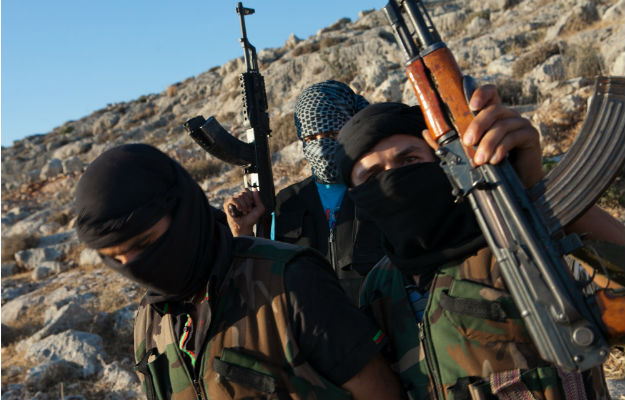In Foreign Affairs, Michael Bröning makes an impressively weak case for directly arming the Syrian rebels. He acknowledges the unfortunate fact that aid and weapons from Arab Gulf states have “primarily reached the more extreme groups,” but claims that the new National Coalition Opposition, which President Obama and more than 90 countries have officially recognized, “changes the conflict’s  parameters.” He argues that “Arming and financing the National Coalition could strengthen the more moderate opposition forces in Syria.”
parameters.” He argues that “Arming and financing the National Coalition could strengthen the more moderate opposition forces in Syria.”
…the facts on the ground have increasingly overrun the standard arguments against supporting anti-Assad forces, and the case for arming the rebels grows stronger by the month.
Critics of a more active support for the opposition have long bemoaned the lack of a coherent opposition body that could bring together the various political and military opponents of the regime. But now, the newly established Syrian National Coalition for Revolutionary and Opposition Forces, which was founded with U.S. assistance in Qatar in November, has done just that.
Actually, it hasn’t. The Coalition is supposed to be made up of Syrian dissidents and opposition groups from across the spectrum. But it is largely another exile group without strong roots inside the country. There little evidence the Syrian people accept it. But there is strong evidence it has been vehemently rejected by the armed rebel groups fighting the Assad regime. And the fact that it was formed as a US initiative grants it even less legitimacy. After all, as Bröning readily admits, arming the rebels would be meant to “accelerate the end of the Assad regime” for the sake of “Syrian and Western interests” (a redundancy to imperialists).
Bröning acknowledges the aid and weapons already being sent to Syria’s rebels by Arab Gulf states have largely gone to extremist jihadists, some of whom have ties to al-Qaeda. What he doesn’t say is that this occurred despite the CIA’s efforts to facilitate the delivery of these arms towards moderate groups. Going back at least six months, intelligence officials have been telling the press (Washington Post, Los Angeles Times) that the truth is that the US had little control over who received the assistance.
Nor does Bröning explain what is to happen if and when the Assad regime does fall. He argues that fully committed Western support would make moderate elements of the Syrian opposition stronger than the extremists. That is unconvincing. But even if it were true, we’d still have a situation where rebel group was pitted against rebel group and an ongoing proxy war would be likely to result. Furthermore, all the rebels have proven capable of is fighting, not state building, social services, and post-conflict reconstruction. The opposition, despite the hopes and dreams of people like Bröning, is still very fractured and many of these groups would imitate the Libyan rebels and refuse to cede local control and, importantly, their weapons.
The overwhelming fact is that the interventionist policies in Syria are worsening the conflict. UN rights chief Navi Pillay has repeatedly condemned the continued flow of weapons from foreign powers to both sides in the Syrian conflict. “The ongoing provision of arms to the Syrian government and to its opponents feeds additional violence,” she said. “Any further militarization of the conflict must be avoided at all costs.”
And supporting rebel groups in civil wars has a terrible record throughout history. As usual, the rosy picture of the future painted by self-assured interventionists never materializes. A recent study out of Brandeis University concluded “the distillation of historical experience with civil war and insurgency, along with a sober reckoning of conditions on the ground in Syria, make clear” that arming the rebels is “likely to amplify the harm that it seeks to eliminate by prolonging a hurting stalemate.”
Update: To further illustrate sectarian and messy choosing one side over the other can get, today brings news of Syrian rebels battling with pro-Assad Palestinian groups.
Clashes between Syrian rebels and an armed Palestinian group loyal to President Bashar Assad raged inside a Damascus refugee camp Tuesday, as the Syrian military deployed tanks outside, activists said.
…as the civil war deepened, most Palestinians backed the rebels, while some groups — such as the Popular Front for the Liberation of Palestine-General Command — have been fighting on the government side.
Update II: Beyond the predictable risks and contradictions with getting even more involved in this fight, there is then the practical issue (with heavy moral weight) of what I’ve previously called the fatal conceit of policymakers in Washington thinking they have the knowledge and ability to engineer a particular outcome from this chaotic mess.


